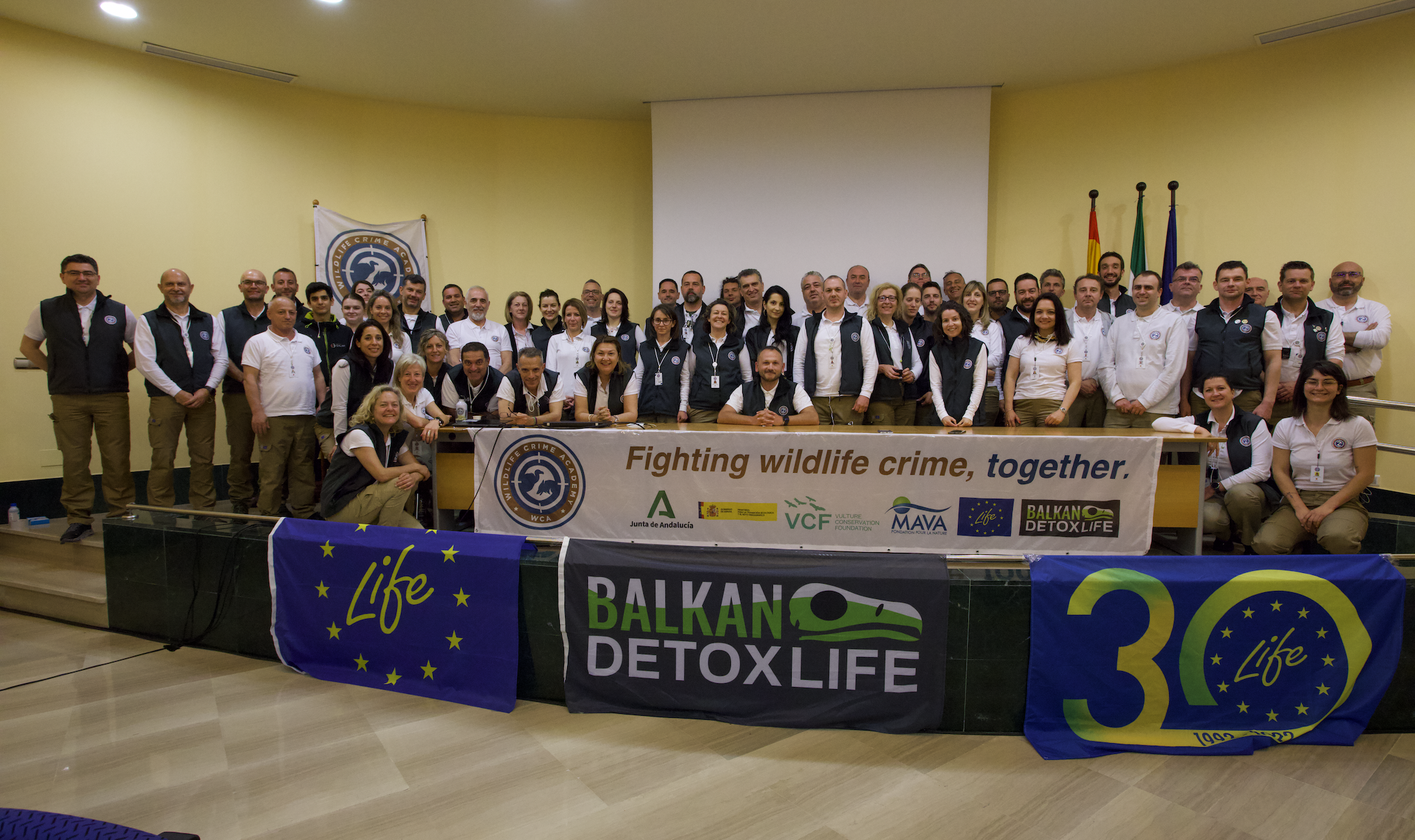With the successful conclusion of the Wildlife Crime Academy‘s Level 3 Supreme Course on Wildlife Crime Analysis and Intelligence last Thursday, 20 April, in Málaga (Spain), the fight against wildlife crime has reached new heights, especially in terms of wildlife crime prosecution. The forty-four passionate participants from nine countries across Europe who obtained qualifications in this highly advanced and specialised field are the first and only professionals in the field of wildlife conservation to do so. Their groundbreaking training is expected to have a significant impact on prosecuting and convicting wildlife criminals, serving as a deterrent to potential offenders and ultimately minimising wildlife crimes, thereby saving the lives of endangered species.
Organised by the Vulture Conservation Foundation and the Junta de Andalucía as part of the EU-funded BalkanDetox LIFE and LIFE with Vultures projects, the Wildlife Crime Academy’s series of three intense training courses have not only filled critical knowledge gaps but have also transformed attitudes towards wildlife crime, elevating it as a serious crime among competent authorities.
Tailored to professionals from diverse academic disciplines working in conservation, law enforcement and forensic science, the training equips participants with the necessary skills to lead investigation efforts, manage teams and elevate the motivational level of relevant stakeholders, essential in combatting wildlife crime. Following internationally recognised procedures from Junta de Andalucía and a syllabus designed by specialists with over 15 years of experience, along with contributions from Europol, the Wildlife Crime Academy’s courses are at the forefront of cutting-edge knowledge and practices.
“By combining Crime Scene Investigation (CSI), forensic science and judicial processes, we have achieved an 80% reduction in illegal wildlife poisoning incidents in Andalusia over the span of 15 years. With the right procedures, perseverance and collaboration, we are confident that our participants can achieve comparable results in their own countries.”
– Iñigo Fajardo, Head of the Protected Species Department at the Junta de Andalucía and one of the Wildlife Crime Academy’s professors
During the Level 3 course, participants honed their skills in profiling suspects and understanding criminal behaviour through practical exams on criminal signatures and case linkage. The theory section covered topics such as Forensic Psychology, Crime Analysis and Criminal Profiling. Participants learned about Behavioral Evidence Analysis methodology and how Intelligence can prevent crime and aid investigation processes, especially when dealing with organised crime and international networks involved in wildlife poisoning and illegal trade. One notable highlight of the Level 3 course was the final exam, a unique exercise where participants had to inspect the contents of a trash bag to gather information and create profiles of suspects.


“Europe has gained 44 new experts in Wildlife Crime Investigation and Analysis from nine countries. We are impressed by their unwavering dedication to combatting wildlife crime and trust that their expertise will make a real difference in preventing illegal wildlife mortality and supporting conservation efforts. Our Wildlife Crime Academy participants have already achieved the first-ever conviction for illegal wildlife poisoning in Cyprus.”
– Jovan Andevski, Programmes Manager at the Vulture Conservation Foundation and coordinator of the Wildlife Crime Academy
With these newly trained professionals leading the charge in the fight against wildlife crime, there is renewed hope for the protection and conservation of endangered species in Europe!
Special thanks
This achievement would not have been possible without the Junta de Andalucía and the Vulture Conservation Foundation for organising the Wildlife Crime Academy, the European Union’s LIFE Programme (BalkanDetox LIFE and LIFE with Vultures), the MAVA Foundation and EuroNatur for providing funding and Ministerio para la Transición Ecológica y el Reto Demográfico for their support.
We are grateful to our experienced professors for generously sharing their expertise: Iñigo Fajardo, Irene Zorrilla, Jose Joaquin Aniceto del Castillo, Alicia Moreno Fernandez, Alfredo Lineros, Justo Martin Martin, Jose Miguel Antonaya Bellido, Salva Pacheco, Jovan Andevski, José Antonio Alfaro Moreno, Antonio Ruiz García, Francisco Velasco Jiménez, Isabel Fernández Verón and Jose Antonio Alfaro Moreno.
And last but not least, we commend the 44 participants who came from different parts of Europe and completed all three modules with their commitment and engagement.


















